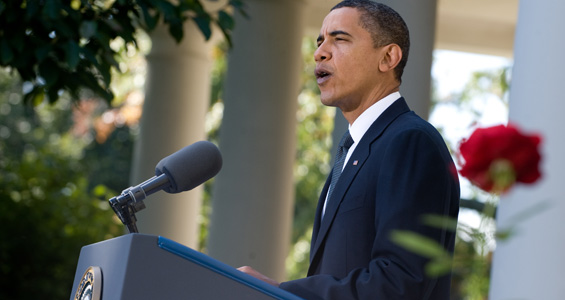Saying ‘No thanks’ to Nobel
Could Obama have turned down his prize? A difficult choice made by just a few so far.

 |
|
Some have called for Barack Obama to turn down the Nobel Peace Prize [AFP] |
They are the most prestigous awards on the planet, reserved to recognise those at the very top of their field. It is no surprise that cases of people passing up a Nobel Prize are few and far between.
But that is exactly what some critics are saying Barack Obama should have done when he was awarded the Nobel Peace prize last week.
Keep reading
list of 4 itemsWorld Press Freedom Day: Gaza conflict deadliest for journalists
Israeli firms sold invasive surveillance tech to Indonesia: Report
Abu Ghraib: Iraqi victims’ case against US contractor ends in mistrial
Just eight months into the Obama presidency, they believe that refusing the prize on the grounds that he had not yet had time to earn it would have sent a powerful message of intent.
Such a refusal would also have seen him join an exclusive club of winners who have turned down the prizes, which are awarded annually for outstanding achievements in the fields of Chemistry, Physics, Medicine, Literature, Economics and Peace.
Of the 821 Nobel laureates that have been awarded the prizes since their inception in 1901, just six people have refused them.
Four of those were pressured into rejecting the award by their governments- three Germans who Hitler barred from accepting prizes in the run-up to the Second World War, and the Russian writer Boris Pasternak, who refused the 1958 Literature prize for fear of reprisals from the Soviet government. His son collected the medal on his behalf in 1989.
Only two people have refused the awards of their own volition, and they did so for very different resons.
Peace prize during war
In 1973, North Vietnamese negotiator Lu Duc Tho was jointly awarded the Nobel peace prize with Henry Kissinger for their talks to end the violence in South East Asia.
| FROM THE BLOGS | ||||||
|
He immediately rejected it, pointing out that peace had not yet been established in Vietnam, and the award was therefore premature.
His reaction caused acute embarrassment to Kissinger, who had initially accepted the award, and then unsuccessfully tried to return it when news of Tho’s refusal emerged.
Nobel prizes cannot be returned, nor can they be rescinded; it is simply not possible to be stripped of a prize after it is awarded.
With the US military still in Iraq and the prospect of increasing troop commitments in Afghanistan, some claim that awarding Obama the peace prize while his country is at war is a contradiction.
But Alfred Nobel himself, perhaps fittingly for the inventor of dynamite, did not specify that peace was a prerequisite for receiving the prize.
In his will, he said that the prize should go “to the person who shall have done the most or best work for fraternity among nations, for the abolition or reduction of standing armies, and for the holding and promotion of peace congresses.”
Philosophical problems
The only other refusal of a Nobel prize came from French existentialist philosopher Jean-Paul Sartre, who turned down the literature prize in 1964. He believed that accepting the award would compromise his status as a writer.
“It is not the same thing if I sign Jean Paul Sartre or if I sign Jean Paul Sartre, Nobel Prize winner,” he explained at the time. “A writer must refuse to allow himself to be transformed into an institution, even if it takes place in the most honourable form.”
 |
| Jean-Paul Sartre refused a Nobel Prize in 1964 [GETTY] |
As the author of two bestselling books that helped to launch his political career, Obama has already made the very leap that Sartre rejected; the writer “transforming” into an institution.
For Obama it is the addition of “President of the United States”, rather than “Nobel Prize Winner” to his signature that makes the difference; the pressures that come with the latter pale into insignificance when set against those of the former. He could hardly, as Sartre did, see accepting a Nobel prize as compromising the integrity of his work.
Besides, regardless of a Nobel laureate’s feelings about the prize, the committee still records them as the winner. “The fact that he has declined this distinction does not in the least modify the validity of the award,” the awarding panel noted rather tersely when Sartre tried to turn it down. In the end, he was never presented the award, but remains listed as its winner.
The spirit in which this year’s award was given would have made refusal even more complicated.
“It was because we would like to support what he is trying to achieve,” said Thorbjoern Jagland, the head of the committee explained, when asked why Obama had been chosen. He was hinting that aspiration, and not achievement, had swayed the judges’ decision.
Had Obama refused the prize, he would have been snubbing supporters of the very agenda he has committed himself to pushing, and to some extent, rejecting the values for which he was being rewarded.
Deserved or not, his acceptance of the award was almost inevitable. Turning down a Nobel prize is even more difficult than winning one – just ask Jean-Paul Sartre, Nobel Prize Winner, 1964.
Andrew Wander, a media fellow with legal charity Reprieve, works on Al Jazeera’s Public Liberties and Human Rights Desk.


